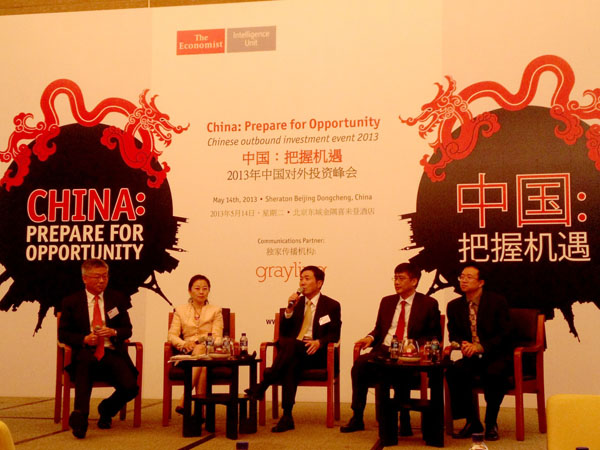Beijing, China
As China continues its shift into becoming an economic superpower, the country’s outbound investment is rapidly increasing. What are some of the opportunities and challenges faced by Chinese enterprises during their overseas expansion? Teng Bingsheng, CKGSB Associate Dean and Associate Professor of Strategic Management, shed light on this question during the Economist Intelligence Unit’s Chinese Outbound Investment Event in Beijing on May 14, 2013, during a discussion panel on “The Challenges and Opportunities of Doing Business Outside of China.”
At the event—themed “China: Prepare for Opportunity”—Teng pointed to two successful cases to show how some Chinese companies are investing abroad. “10 years ago, Haier established a refrigerator assembling factory in the United States,” he explained. “Organic growth with in-house manufacturing carried out overseas is a way of outbound investment. Although the majority of Huawei’s R&D is completed in China, most of their sales team is abroad.”
What’s next for Chinese outbound investments? Panelist Cynthia Wang, who serves as the Executive Director for Investment Banking at CICC, emphasized a shift from state to private players. “Between the mid-1990s and 2010,” she said, “China became the fifth largest foreign investor. While Chinese outbound investment used to be dominated by state-owned companies, now private players are taking on an increasing role.” Moreover, they are moving up the value chain. “In the past few years,” Cynthia explained, “Chinese companies investing abroad have been increasingly buying businesses with technology and know-how. They are buying technique, expertise and experience.”

What are some of the obstacles confronted by Chinese companies with investments abroad? Panelists pointed mostly to talent, political risks and integration. Mercer’s Talent Business Leader for Greater China, Zheng Wei, said the biggest problems with outbound investments from China are HR integration and cultural barriers. How should companies tackle these issues? “Leadership must have an open and inclusive mentality,” said Zheng. Moreover, it’s a two-way learning process. “The ‘acquirer’ isn’t necessarily better than the ‘acquiree.’” Besides mental preparation, Zheng also suggested on-the-ground work with respect to government relations and PR efforts to help avoid giving the public the impression that a deal is a purely commercial.
Cynthia warned Chinese companies of the importance of avoiding political risks. She raised the example of a successful Chinese coal business which acquired a local coal mine in Australia. The Chinese company did not expect much export to derive from this mine, instead, it sought to apply to the Australian mine its latest and most advanced technology developed in China. They saw this acquisition deal as an experience. The local government appreciated the Chinese company for not destroying the environment and for not laying off Australian employees. As a result, the government was supportive of this company thereafter.
Teng concluded the panel with one final piece of advice. When a Chinese company acquires a successful business abroad, “leave them alone,” he suggested. This way, the business will continue to grow and the acquirer will score political points and the public’s support.